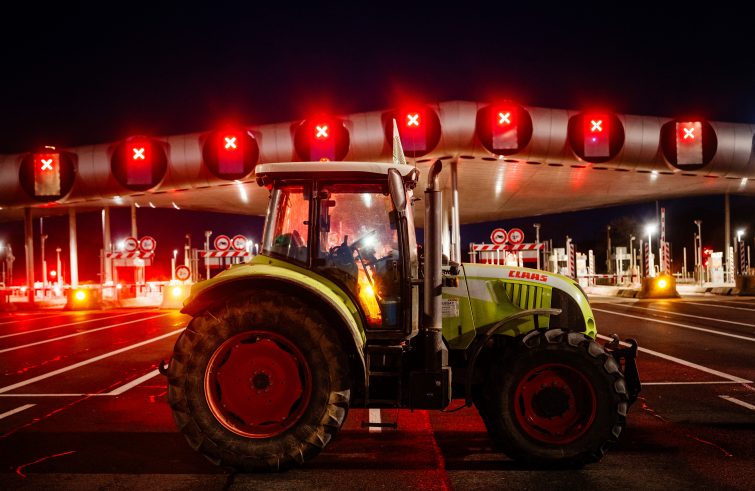
As we speak, the protest of European farmers is rolling towards Brussels. On 1 February 2024, they will all gather on the Place de Luxembourg in front of the European Parliament. There have been such demonstrations before, and they have not always been “peaceful”. The farmers’ rage, when unleashed, is unpredictable. But what is the cause of all this? There are many reasons, and some of them differ according to the type of farm, whose representatives have been taking to the streets for the past weeks.
It has happened before, we are told. And there are at least two other episodes worth recalling, because history is always a useful guide to the present situation.
Just over fifty years ago – on 15 February 1971 – farmers, accompanied by their cows, disrupted a meeting of the Council of Agricultural Ministers in Brussels. At the time, their aim was to change the agricultural policy, which called for a freeze in the prices of agricultural products in order to reduce the surpluses. At the turn of the century, in February 1999, a new demonstration brought more than 40,000 farmers onto the streets of Brussels, which were once again deserted and cordoned off. It was not a peaceful demonstration, and even then the aim was to thwart a policy that the producers saw as overly restrictive and punitive.
Today, after weeks of roadblocks, tonnes of manure dumped in front of government buildings, long convoys of tractors, angry farmers and accidents (one death in France and one in Italy), the farmers resumed their march to the EU headquarters with the aim of once again stopping an EU agricultural policy that they feel is out of touch and overly punitive.
The reasons are summarised in a statement by Coldiretti (Italy’s main farmers’ organisation, TN) concerning the protest in Brussels: “The first mobilisation of European farmers against EU-insanity threatening agriculture has begun”.
So far, at least two main issues have sparked the protests.
The first is the mandatory requirement to leave a large part of arable land uncultivated, and the second is the general policy of trade agreements with non-European producers. The farmers protest against the change of agricultural policy to positions and commitments which they consider to be overly “green” (the so-called “Green New Deal”) and detrimental to production and consumers. They argue that such constraints would, among other things, make European agriculture uncompetitive with the rest of the world. Confagricoltura (the organisation for the protection and representation of Italian agribusinesses, TN) highlighted “the dissatisfaction of EU farmers with the Green Deal – which has in fact put the entire primary sector in the dock”. The effects of climate change, with alternating extreme droughts and heat, floods and severe frosts, have also been weighing heavily for years. The Italian Farmers’ Association (CIA-Agricoltori Italiani) pointed out that “no agricultural sector is untouched by the crisis that is now widespread and generalised, in the context of geopolitical, climate-related and phytosanitary emergencies”. On top of that, there are the consequences of two ongoing wars and the soaring cost of production materials in some periods (the Red Sea crisis being the most recent in chronological order). Not to mention the label debate and the protection of typical products.
In addition to general causes, there are also “local” ones.
In recent weeks, the proposal to increase taxes on plant protection products and water has triggered protests in France. In Poland, Hungary and Romania, protests were sparked by the import of wheat from Ukraine. In the Netherlands, there were protests against government measures to reduce the size of livestock farms in order to reduce nitrogen emissions.
And yet, it should not be forgotten that Europe is allocating billions of euros to the agricultural sector. In the period 2023-2027, more than a third of the funds ( approximately €300 billion) will be allocated to agriculture. Too little? Or badly distributed?
There are also some objective data that seem to point to improvements. According to Eurostat, the average price of European agricultural products as a whole increased by 2% in 2023 compared to 2022, while the average price of goods and services consumed in agriculture decreased by 5%. Of course, averages alone are not facts.
In the face of all this, governments are taking action, and EU Commission President Ursula von der Leyen has launched a new forum called the “Strategic Dialogue on the Future of Agriculture.”
Some bishops have spoken out in support of farmers. The Commission of the Bishops’ Conferences of the European Union (COMECE) issued a statement expressing solidarity with farmers and calling on policy-makers to put the human person at the centre of policy deliberations on agriculture. According to COMECE, “a sustainable future for our food system and a secure and prosperous future for farmers can coexist”.
It will be necessary to find a compromise that reconciles general and environmental needs with productive and local needs.
Meanwhile, a major risk looms on the horizon. As has happened in the past, the farmers’ protests are fuelled by populism, by the tendency to defend personal agendas, by parochialism, by demagogic rhetoric about the ‘good old’ rural traditions.
As a result, the legitimate demands of farmers (who in many cases cannot cover their production costs) risk being swallowed up by other demands. And by the resurgence of the nation state. It is no coincidence that the French Prime Minister, Gabriel Attal, declared a few days ago that his government had “taken resolute action to defend the agricultural sovereignty of our country” and that “our agriculture is a strength, not only because it literally provides us with food, but because it is a cornerstone of our identity and our traditions. Because our farmers embody fundamental values.”









